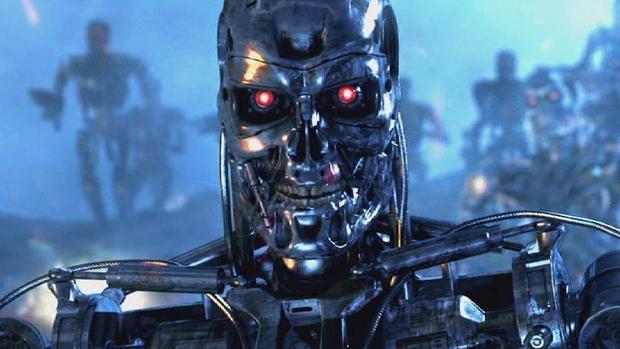Will you lose your marketing job to a machine?

Marketing Automation: the Death of Your Gig?
Every day, machines are discovering exciting new ways to eliminate jobs through the wonders of automation. The latest robots are able to ship boxes, drive 18-wheelers and kill you from the skies. Software is replacing financial analysts, administrative assistants and even writers (rest assured: this column is written by a real-life hack, not a machine).
Luckily, marketing is immune to this trend. The ability to identify and captivate an audience with carefully refined campaigns and ad copy has proven remarkably resilient; your job is secure for the foreseeable future.
Just kidding: you should be concerned.
Marketing automation: it’s accelerating.
Marketing is not necessarily rocket science (although rockets are landing themselves now, so rocket science seems not as big a deal these days). Marketing doesn’t require tremendous amounts of technical ability compared to many other professions such as programming, data science, etc. Unfortunately, marketing has not proven as resilient to automation as those disciplines have:
- HubSpot takes your marketing funnel and email campaigns and puts them (largely) on automatic. This ticks the CRM, email and marketing funnel automation boxes.
- WordStream automatically optimizes and adjusts your AdWords buy.
- PosiRank automates much of your SEO (although maybe not the way you want it to).
- Google Analytics is better than ever at telling you exactly what’s happening on your site without you having to lift a finger.
- Hootsuite and a dozen other competitors scour the web for social media content you can re-share, and will even schedule it for you.
You still need marketing and ad copy to feed all of the above automata, but even content creation is becoming automatic.
Your options. Sort of.
What’s a poor marketer to do? Here are a few options:
- Chuck it all and go back to law school (except that legal jobs are disappearing, thanks to offshoring, templates and the on-demand economy).
- Embrace big data and become a marketing intelligence guru / nerd. This is a viable option, unless you hate math, which applies to an unfortunate number of marketers.
- Refocus on strategy.

Option #2
(Hint: option #3 is the answer)
Is your job like stuffing envelopes?
Strategy is one area where software is unlikely to replace humans, at least until artificial intelligence makes another great leap forward. Why? Because of algorithmic thinking. Any task that can be reduced to an algorithm (a pre-determined series of steps) is easy to automate; non-linear tasks are difficult to automate. Think about it: how hard is it to explain to someone how to post a letter?
- Fold letter in three.
- Place in envelope.
- Write your address in the top left of the envelope.
- Write the recipient’s address in the middle of the envelope.
- Place a stamp in the top right of the envelope
- Seal envelope.
- Place in mailbox.
- Margaritas!

Your just desserts. Delicious, fruity just desserts.
(Step #8 is optional). This is why mass mailings were automated ages ago: anyone can follow the above sequence of steps, which makes it relatively an easy for a machine to do so.
Speaking algorithmically….
Unfortunately for marketers, algorithmic thinking applies to a large number of marketing tasks. Take AdWords: it’s not rocket science, and can now largely be automated. Six years ago, marketers didn’t have the ability to have AdWords bids automatically adjusted, run A/B experiments to automatically find the best ad copy, automatically optimize spend for CTR, CPC, etc…. A dozen different virtual gears have come together to automate the process more than ever.
HubSpot does a similar thing with email, sending out the right copy to the right audience at the right time to maximize conversion. The largest part of what you have to do is to simply set up the campaign. In fact, the “setting up” part is easy: it’s the strategy part that’s still a bit of a wrench:
- How will you work with influencers to tap into their audiences?
- How will you get internal stakeholders on side?
- What are the most important metrics the client will buy into?
- What new technologies do you need to identify and test, and how will you do it?
- What is the competition doing well?
- How can you minimize risk?
No software or machine is able to tackle these questions yet. At some point in the foreseeable future, machines will become smarter than us, and then all bets are off. Until that time, the ability to think creatively at a strategic level and solve problems that have no template or prototype will separate the employed from the jobless.
I leave you with a quick acid test for job security: if your day-to-day work follows a pattern, be concerned. If you have no clue what your day will look like, you might ok for a bit longer.
Photos: https://www.flickr.com/photos/elitistczar/6300378608/ and https://www.flickr.com/photos/mlukesh/4091821360/





